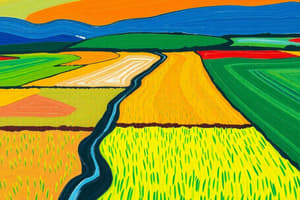Podcast
Questions and Answers
What is the main purpose of crop production?
What is the main purpose of crop production?
- To minimize crop yield
- To deplete soil health
- To maximize water loss
- To grow plants for food, feed, fiber, or other purposes (correct)
Which of the following is NOT considered a major field crop?
Which of the following is NOT considered a major field crop?
- Lentils
- Vanilla beans (correct)
- Sunflower seed
- Cottonseed
What are the two main methods of irrigating crops mentioned in the text?
What are the two main methods of irrigating crops mentioned in the text?
- Surface irrigation and aerial irrigation
- Spraying irrigation and dripping irrigation
- Subsurface irrigation and pivot irrigation
- Flood irrigation and sprinkler irrigation (correct)
Which aspect is NOT involved in managing crop production according to the text?
Which aspect is NOT involved in managing crop production according to the text?
Why is it important to employ effective irrigation techniques?
Why is it important to employ effective irrigation techniques?
What is the primary goal of integrated pest management (IPM)?
What is the primary goal of integrated pest management (IPM)?
How does soil management contribute to sustainable farming systems?
How does soil management contribute to sustainable farming systems?
What is a key benefit of crop rotation in agriculture?
What is a key benefit of crop rotation in agriculture?
Which soil management practice contributes to reducing compaction and improving soil structure?
Which soil management practice contributes to reducing compaction and improving soil structure?
What distinguishes drip irrigation from sprinkler irrigation?
What distinguishes drip irrigation from sprinkler irrigation?
Flashcards are hidden until you start studying
Study Notes
Crop Production and Management
Crop production is the process of growing plants for food, feed, fiber, fuel, or other purposes, while crop management refers to the practices used to optimize crop yield and quality. There are several aspects involved in managing crop production, including selecting the right type of crops, employing effective irrigation techniques, controlling pests, managing soil health, and planning crop rotations.
Types of Crops
There are various kinds of crops that can be grown depending on climate, geography, and market demands. Some common categories of major field crops include cereals such as wheat, rice, corn, oats, barley, and rye; legumes like beans, peas, lentils, and chickpeas; oilseeds like soybeans, rapeseed (canola), cottonseed, sunflower seed, and sesame seeds; and sugar crops like sugarcane, sugar beets, sweet sorghum, and molasses from sugarcane. These diverse plant species serve different agricultural functions and cater to various human needs.
Irrigation Methods
Irrigation plays a crucial role in ensuring sufficient water supply to crops, especially during periods of drought or when rainfall is insufficient. There are two main methods of irrigating crops - surface irrigation and sprinkler irrigation. Surface irrigation involves flooding the entire field with water, which can lead to water loss through evaporation and runoff if not managed properly. On the other hand, sprinkler irrigation uses artificial rain to distribute water evenly over the cropland, minimizing wasted water and promoting efficient crop growth. Other advanced technologies like drip irrigation and micro-sprinklers have also emerged, offering precise water delivery and reduced wastage.
Pest Control
Pests are a significant threat to crop productivity and can lead to substantial economic losses for farmers. Integrated Pest Management (IPM) is a widely adopted approach to controlling pests in sustainable agriculture. IPM combines biological, cultural, physical, and chemical management strategies to maintain pest populations below economically damaging levels without causing negative impacts on non-target organisms or the environment. This holistic approach ensures stable pest control by balancing the benefits and risks associated with each strategy.
Soil Management
Soil management is critical for maintaining fertility and productivity across multiple seasons. It involves good tillage practices like reducing compaction, improving structure, increasing porosity, breaking up clods, and burying residues in the fallow period. Additionally, nutrient cycling promotes sustainable farming systems by converting organic matter into humus, enhancing soil properties like moisture retention and promoting disease suppression. Applying the appropriate amount of fertilizers, minimizing soil erosion, and adopting appropriate crop rotations also contribute to long-term soil health.
Crop Rotation
Crop rotation is the practice of growing different crops in a specific sequence over successive seasons or years. It is an essential part of integrated crop management for maintaining soil health, improving yield, and reducing the risk of pests and diseases. By rotating crops, farmers can avoid continuous cultivation of a single crop, which reduces the likelihood of soil-borne pests and diseases. This rotation not only enhances soil quality by promoting the growth of beneficial soil microbes but also provides better nutrient cycling and helps to maintain soil structure.
Studying That Suits You
Use AI to generate personalized quizzes and flashcards to suit your learning preferences.




